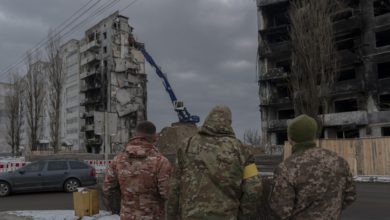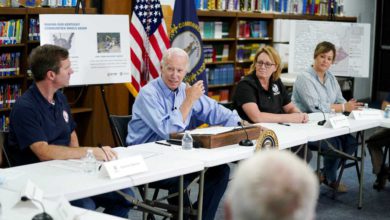
After weeks of investigating, the Ohio Department of Education released a scathing report Friday, accusing Bishop Sycamore, the Columbus high school that made national news for flopping during a football game, of being nothing more than "a scam."
A damning 79-page report claimed investigators could not find proof Bishop Sycamore met any of the requirements for private, non-chartered schools like holding regular classes, verifying teacher credentials or maintaining academic records.
"Unfortunately, the facts suggest that Bishop Sycamore High School was and is, in fact, a scam ...," State Superintendent Stephanie Siddens wrote in a memo attached to the report. "Bishop Sycamore was a way for students to play football against high school teams and potentially increase students’ prospects of playing football at the collegiate level."
Attempts to reach Bishop Sycamore by phone and email were unsuccessful Friday.
Here is what investigators found.
The school did not meet or did not provide proof it met state standards
Ohio kids can attend a variety of different K-12 schools, and each of them comes with a different level of oversight. And Bishop Sycamore's founders chose the one with the lowest level of requirements, a private, non-chartered academy.
Non-charted, non-public schools don't seek accreditation from the State Board of Education (often for religious reasons), and they don't receive state funding.
State law only requires that they meet a set of minimum education standards, including filing annual reports that detail their hours of instruction, teacher qualifications and classroom safety.
"There is no evidence that the ‘school’ enrolled students this year, had a physical location for classes to meet, employed teachers, nor offered any academic program meeting minimum standards," Gov. Mike DeWine said in a statement.
In fact, investigators were only able to confirm the enrollment of a single student this year who was using a different online learning program.
Graduation Alliance, a degree program for kids and adults, told investigators it enrolled 19 Bishop Sycamore students for the 2020-2021 school year, but their attendance was intermittent at best. By January 2021, only five students remained.
"Yet in both years, the school was able to field a football team," the report stated. "The certifications belie the representation of (Director) Andre Peterson to USA TODAY that Bishop Sycamore had 'between 75 and 80 students.' Either the certifications were inaccurate, or Peterson’s statement was untrue. Possibly both."
Investigators had doubts
Peterson and his former football coach Roy Johnson spoke with investigators on November 18, but there were questions about the truth behind their statements.
For example, Peterson forwarded an email chain between a staff member and Graduation Alliance inquiring about their teachers' credentials dated 11 days after a call with department staff.
"The exchange casts doubt on whether Bishop Sycamore staff had been verifying qualifications," according to the report.
The men also said the school provided religious instruction that wasn't reflected on transcripts -- leaving investigators unable to "ascertain whether those religious beliefs are truly held."
Investigators were able to say students didn't get enough hours in the classroom during 2020-2021 school year, but they couldn't say for certain whether that was true for this year. The school currently lists a private residence as its address.
And the public statements about the schools "have been consistently inconsistent," according to the report.
The new head coach issued a statement earlier this year saying, "we do not offer curriculum. We are not a school ... that was a mistake on paperwork."
But the school filed for another annual certification with the education department at the end of September.
"Bishop Sycamore officials were given the opportunity to provide additional information to demonstrate the school’s legitimacy and compliance," according to the report. "They declined to do so ... Without the clarification from the school to prove its compliance, common sense leads one to the most obvious explanation: Bishop Sycamore is not a school as it purports on paper to be."
State lacks disciplinary authority
Despite all the concerns that officials had about Bishop Sycamore, the most that the education department could do was remove the school from its list of private, non-chartered options.
The school has no state charter to revoke and no state dollars to rescind.
That's one of the reasons DeWine asked Ohio Attorney General Dave Yost and "other offices with jurisdiction to determine whether the alleged deception by Bishop Sycamore violated any civil or criminal laws."
A spokesperson for Yost said his office looked into some initial concerns when the story first broke and found no authority to take action
"With the Governor’s broader request, we are examining other sources for legal authority and will respond soon," Bethany McCorkle said.
Legal changes in the new year?
The report also called on state lawmakers to change the oversight rules for Ohio's 401 non-chartered, non-public schools.
"This case demonstrates the systemic weaknesses that allow for the continued operation of non-chartered, non-tax supported schools that are not meeting the minimum standards," according to the report.
For example, the department lacks legal authority to monitor and enforce those standards. And the deadline to submit paperwork is Sept. 30 – several weeks after most kids start school.
DeWine said in a statement that he would work with lawmakers to implement these changes, and Sen. Andrew Brenner, R-Delaware, told the USA TODAY Gannett Ohio Network that he's open to the idea as well.
Brenner, who chairs the Senate Education Committee, said most of the proposed changes looked they were common sense.
Anna Staver is a reporter for the USA TODAY Network Ohio Bureau, which serves the Columbus Dispatch, Cincinnati Enquirer, Akron Beacon Journal and 18 other affiliated news organizations across Ohio.
Source link






